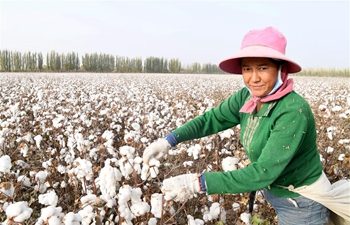by Yuan Mengchen, Wang Jin
BANGKOK, Oct. 31 (Xinhua) -- Cross-border e-commerce whets the appetite of millions of Chinese consumers for Thailand's fresh durian fruits.
"Monthong", which literally means "golden pillow" in Thai, is the most popular durian variety characterized by triangular spikes and pale yellow, creamy flesh. This particular durian variety is not easy to find in the Chinese market when cross-border e-commerce didn't rise between China and Thailand.
Things changed in April 2018 when Chinese e-commerce giant Alibaba signed a 428 million U.S. dollar deal on durian fruit sales with the Thai government.
Under the deal, the China-based e-commerce operator agreed with Thailand to work together in a number of areas, including e-commerce, digital logistics and training. The agreement paved the way for the speedy delivery of Thai productions like durian to China.
Within 60 seconds on T-mall, a Chinese online shopping website operated by Alibaba, in April 2018, Chinese consumers ordered 80,000 "golden pillow" durians.
Speedy delivery of durian is important to maintain the freshness of the special-odored fruit, according to Gao Mengdi, a durian producer in Thailand.
Gao stressed the need to pick the fruit at the right temperature and said it can last only 10 days at 13 degrees Celsius.
Because of the 2018 deal, Alibaba invested to build a logistics and storage hub in Thailand. Cainiao, the logistics arm under Alibaba, can now deliver fresh "golden pillow" durian to China within five days. Durian lovers in major cities across China can now taste fresh durian without leaving their homes.
Wan Lin, the president of Cainiao, said the company is working to further speed up the export process of durian and other Thai produce to China from 120 hours to 72 hours.
"We are trying to help more quality Thai goods reach Chinese consumers quickly, and make it easier for Thai small and mid-size enterprises (SMEs) and agricultural producers to participate in China-ASEAN trade," Wan said.
Alibaba founder Jack Ma has earlier said, "China is on its way to be the world's largest consumer, driven by rising income and a growing middle class of 300 million. There is no better time than now for trade-oriented countries to seize this opportunity to export to China as the country continues to open its doors wider for global trade."
"Given Thailand's unique strengths in people and culture, we are confident of its future and growth potential under the government's policy to expand the economy beyond heavy industry and agriculture to technology and other innovations," Ma said.
Alibaba first came to Thailand in 2016 when it partnered with the Thai government to strengthen e-commerce capabilities for small and medium-sized businesses in the kingdom with a population of more than 68 million.
Now Thailand sells and delivers more than 200,000 tons of fresh "golden pillow" durians to China through T-mall and Cainiao every year.
Besides "golden pillow" durians, rice and bananas from Thailand also reach Chinese consumers through cross-border e-commerce.
China has become one of the main target export markets for Thai agricultural products. In the first three quarters of 2019, the amount of fruits that China has imported from Thailand increased around 90 percent from the same period last year.
With the booming cross-border e-commerce trade between China and Thailand, the total bilateral trade volume reached 87.52 billion U.S. dollars in 2018, a 9.2 percent year-on-year increase, according to China's statistics.
In 2018, China was Thailand's biggest trade partner and Thailand was China's third-largest trade partner among the ASEAN countries.
Thai Deputy Prime Minister Somkid Jatusripitak said there are a large number of farmers in Thailand, producing large quantities of agricultural products every year.
Indeed, he said the cooperation between Alibaba and Thailand will further boost Thailand's agricultural production and contribution to the global market, and bring more benefits to local Thai farmers.
On the other hand, cross-border e-commerce also gives Thailand's customers convenient access to Chinese products sold online.
In September 2018, JD CENTRAL, a new online shopping platform was officially launched in Thailand. The e-commerce joint venture was an outcome of cooperation between Chinese online retailer giant JD.com and top Thai retailer Central Group.
The opening of JD CENTRAL online shopping allows Bangkok residents to order Chinese products through the so-called "211 service" offered by JD CENTRAL, meaning that any order placed before 11 a.m. could be delivered on the same day, or the next day if the order is placed before 11 p.m.
JD CENTRAL Chief Executive Officer Vincent Yang said cross-border e-commerce reflects the irreversible trend of continuing expansion and mutual integration through globalization.
"E-commerce has been an important driving force for China's economic and social development, and I hope it can also promote the development of Thailand's digital economy in the future," he said.

















